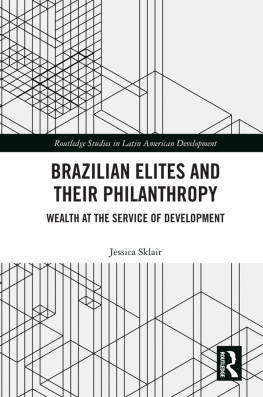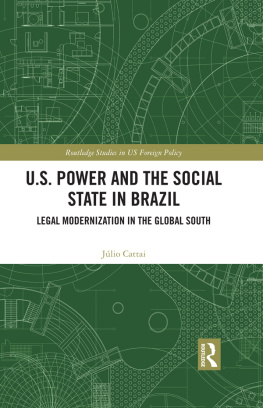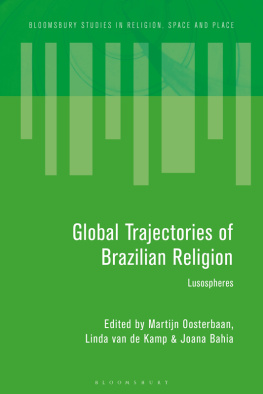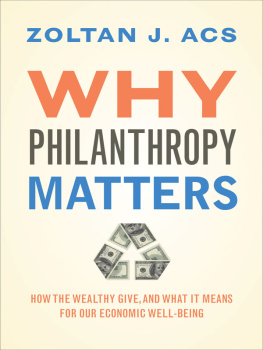Brazilian Elites and their Philanthropy
This book explores the philanthropy of Brazilian elites during a key period in recent Brazilian history, from Workers Party president Lulas last term in office through to the election of far-right president Jair Bolsonaro.
Against this backdrop of political upheaval, the book asks what philanthropy can reveal about the role of corporate and wealth elites in upholding the structures of socioeconomic inequality that continue to define Brazilian society. The book argues that around the world the private sectors growing engagement in international development has led to the emergence of a global philanthropic project centred on practices of philanthrocapitalism and social finance, which ultimately seeks to legitimise global capitalism and the elite interests it serves. Drawing on an in-depth and wide-ranging ethnographic study among philanthropists and their advisors in over 30 Brazilian foundations and intermediary organisations, the book combines a structural critique of the capitalist ideologies underlying philanthropic practice with a robust exploration into the ways in which wealthy Brazilians appropriate philanthropy directly to legitimise elite reproduction and the accumulation of wealth.
Researchers across Latin American studies, development studies and the anthropology of development will find this book a timely contribution to the under-researched areas of elite studies and the study of philanthropy.
Jessica Sklair is Research Fellow at the Margaret Anstee Centre for Global Studies, Newnham College, University of Cambridge, UK.
Routledge Studies in Latin American Development
The series features innovative and original research on Latin American development from scholars both within and outside of Latin America. It particularly promotes comparative and interdisciplinary research targeted at a global readership.
In terms of theory and method, rather than basing itself on any one orthodoxy, the series draws broadly on the tool kit of the social sciences in general, emphasizing comparison, the analysis of the structure and processes, and the application of qualitative and quantitative methods.
Market Liberalizations and Emigration from Latin America
Jon Jonakin
Money from the Government in Latin America
Conditional Cash Transfer Programs and Rural Lives
Edited by Maria Elisa Balen and Martin Fotta
Demobilisation and Reintegration in Colombia
Building State and Citizenship
Francy Carranza-Franco
Welfare and Social Protection in Contemporary Latin America
Edited by Gibrn Cruz-Martnez
Industrial Development in Mexico
Policy Transformation from Below
Walid Tijerina
The Informal Sector in Ecuador
Artisans, Entrepreneurs, and Precarious Family Firms
Alan Middleton
Development Banks and Sustainability in the Andean Amazon
Edited by Rebecca Ray, Kevin P. Gallagher and Cynthia A. Sanborn
Bolivia at the Crossroads
Politics, Economy, and Environment in a Time of Crisis
Edited by Soledad Valdivia Rivera
Legal Experiments for Development in Latin America
Modernization, Revolution and Social Justice
Helena Alviar Garca
Brazilian Elites and their Philanthropy
Wealth at the Service of Development
Jessica Sklair
First published 2022
by Routledge
2 Park Square, Milton Park, Abingdon, Oxon OX14 4RN
and by Routledge
605 Third Avenue, New York, NY 10158
Routledge is an imprint of the Taylor & Francis Group, an informa business
2022 Jessica Sklair
The right of Jessica Sklair to be identified as author of this work has been asserted by her in accordance with sections 77 and 78 of the Copyright, Designs and Patents Act 1988.
All rights reserved. No part of this book may be reprinted or reproduced or utilised in any form or by any electronic, mechanical, or other means, now known or hereafter invented, including photocopying and recording, or in any information storage or retrieval system, without permission in writing from the publishers.
Trademark notice: Product or corporate names may be trademarks or registered trademarks, and are used only for identification and explanation without intent to infringe.
British Library Cataloguing-in-Publication Data
A catalogue record for this book is available from the British Library
Library of Congress Cataloging-in-Publication Data
Names: Sklair, Jessica, 1975- author.
Title: Brazilian elites and their philanthropy: wealth at the service of development / Jessica Sklair.
Description: Abingdon, Oxon ; New York, NY : Routledge, 2022. | Series: Routledge studies in Latin American development | Includes bibliographical references and index.
Identifiers: LCCN 2021023011 (print) | LCCN 2021023012 (ebook) | ISBN 9780367442170 (hardback) | ISBN 9781032122137 (paperback) | ISBN 9781003008378 (ebook)
Subjects: LCSH: WealthMoral and ethical aspectsBrazil. | CharitiesBrazil. | Elite (Social sciences)Brazil. | PovertyBrazil. | Social responsibility of businessBrazil. | Brazil--Social conditions. | BrazilEconomic conditions.
Classification: LCC HC190.W4 S55 2022 (print) | LCC HC190.W4 (ebook) | DDC 305.5/2340981dc23
LC record available at https://lccn.loc.gov/2021023011
LC ebook record available at https://lccn.loc.gov/2021023012
ISBN: 978-0-367-44217-0 (hbk)
ISBN: 978-1-032-12213-7 (pbk)
ISBN: 978-1-003-00837-8 (ebk)
DOI: 10.4324/9781003008378
Typeset in Bembo
by Apex CoVantage, LLC
As wealth accumulation among the global elite continues to drive staggering levels of inequality, elite philanthropists claim with increasing hubris that they can provide solutions to the challenges of global development. Over the last decade, these claims have attracted growing attention both within and beyond academia. While most of this attention has been focused on philanthropy in the global North, researchers have also begun to explore what contemporary elite philanthropy looks like in parts of the world that have traditionally received, rather than driven, international development interventions. This book builds on this work through an ethnographic study of the changing nature of elite philanthropy in Brazil. It explores how elite Brazilian philanthropy has evolved over a decade of fervent political and economic instability, which has seen Brazil swing from its leading role in the swell of Latin Americas left-wing pink tide to become a radical exemplar of global shifts to the alt-right. Against this backdrop, I examine how elite philanthropy has responded in different ways to both local political trends and global shifts in the international development landscape while continuing to serve a national development project aligned with Brazilian elites own interests.














